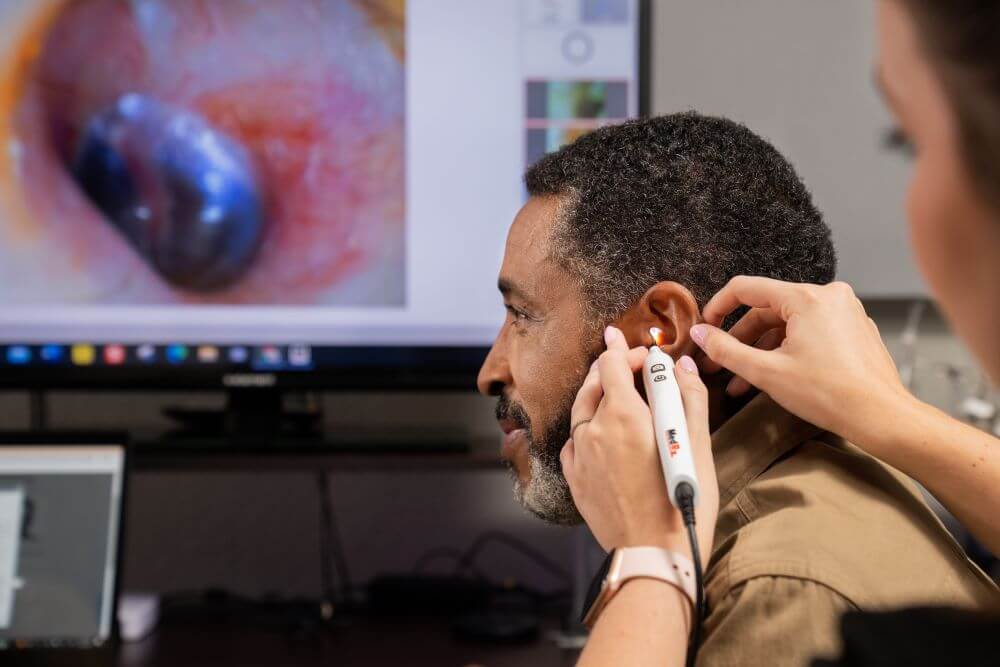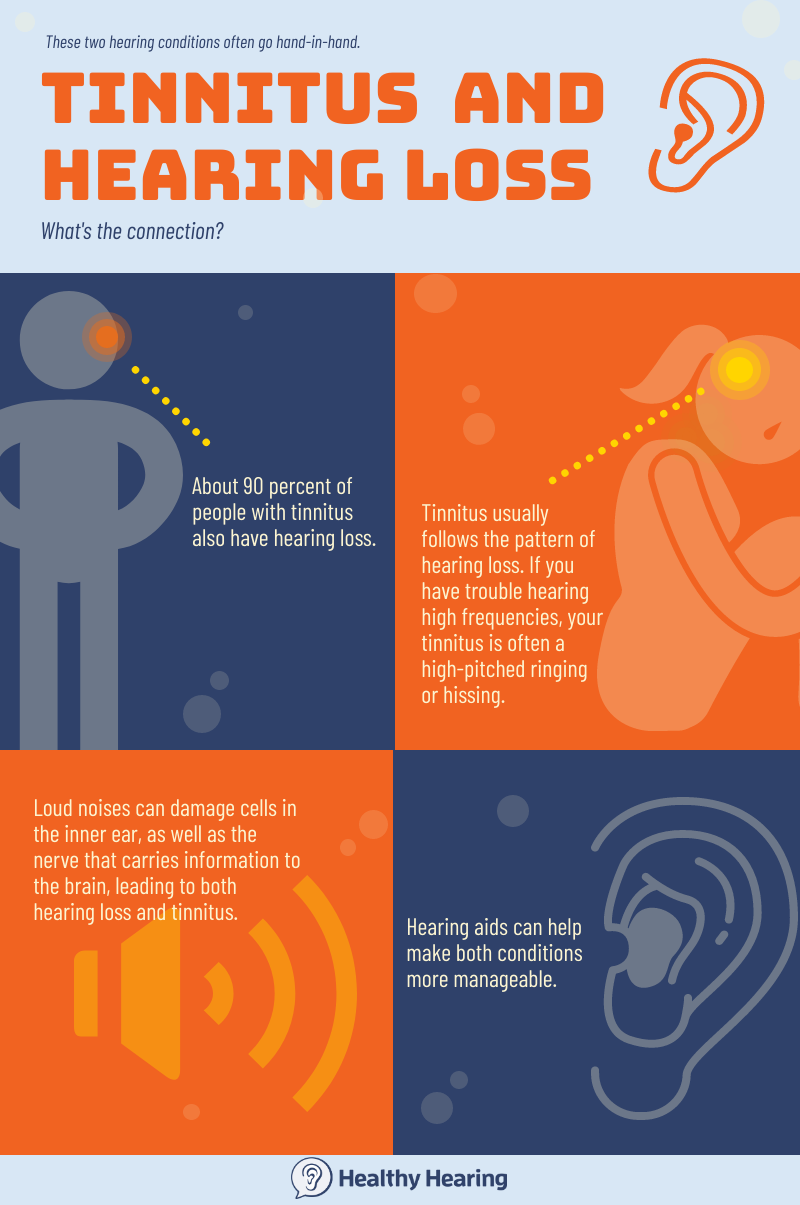Key points:
-
Up to 90% of people with tinnitus also have hearing loss.
-
The connection is often due to damage to the auditory system, from noise exposure or other causes.
-
Hearing aids can help those who experience both hearing loss and tinnitus find relief.
Roughly 15% of adults experience tinnitus, a ringing (or similar noise) in one or both ears, at some point in their lives. The sound may be steady or pulsating, and symptoms can come and go for some and be constant for others. While the cause of tinnitus is not always clear, we do know that it's often linked to hearing loss.
The relationship between hearing loss and tinnitus
Numerous studies have examined the relationship between tinnitus and hearing loss. Research has indicated that up to 90% of people with tinnitus also have hearing loss, though many people may not even realize they have both conditions.
Tinnitus may also follow the pattern of a person's hearing loss. For example, if you have high-frequency hearing loss, your tinnitus may be more likely to be perceived as a high-pitched sound. People with more severe hearing loss may exhibit more severe tinnitus symptoms. Additionally, those with hearing loss in one ear may also experience tinnitus solely in that ear.
However, it's important to note that those patterns do not always hold true. Sometimes people with unilateral hearing loss still experience tinnitus centrally or in both ears. Or a ringing in one ear is due to a cause unrelated to hearing loss, like temporomandibular joint (TMJ) disorder. It's also not the case that everyone with tinnitus experiences hearing loss, or vice versa.
Why the connection?
Dr. Allison King, Au.D., of Palmetto Family Hearing Center in Waxhaw, NC, notes that while there is obviously a strong association, hearing loss doesn't directly cause tinnitus.
"Most theories surmise that damage along the auditory pathways from the ear to the cortical areas of hearing in the brain are involved in tinnitus, thus leading to a strong relationship between tinnitus and hearing loss," said Dr. King.
Your brain, hearing loss and tinnitus
When you experience hearing loss, your brain receives less auditory input. This reduction in stimulation can cause changes in how the brain processes sound. In order to compensate, your brain might increase its sensitivity (think of it like turning up the volume on a speaker). This heightened sensitivity may sometimes lead to a ringing or buzzing in the ears.
Another factor that could explain the connection between hearing loss and tinnitus is neuroplasticity, which refers to the brain's ability reorganize how it works, often in response to an injury or change in function. However, these adaptations can cause unwanted side effects. In the case of hearing loss, the areas of the brain responsible for processing sound might start to misfire, leading to tinnitus.
Hidden hearing loss and ringing in the ears
The term hidden hearing loss refers to hearing loss that is not detectable on standard hearing tests. Most cases of hearing loss occur due to damage of the hair cells of the inner ear and/or the auditory nerve. Hidden hearing loss, on the other hand, is thought to be caused from damage to the synapses between the two.
This type of damage doesn't necessarily affect the ability to detect sounds in quiet backgrounds, which is why standard hearing test results are normal. However, it may cause increased sensitivity and tinnitus because it does affect how sound is transmitted to the brain.
Protect your hearing to reduce tinnitus risk
Prolonged or intense exposure to loud noises can cause noise-induced hearing loss as well as tinnitus. Research has shown that individuals with significant noise exposure, such as musicians or industrial workers, are more likely to experience tinnitus. These findings highlight the importance of using hearing protection devices like earplugs or earmuffs to keep your ears safe.
When to seek help for tinnitus
You may not need to seek help if you only experience symptoms, sporadically. However, it is important to seek medical help if the ringing
- is persistent,
- affects your daily life,
- and/or is accompanied by other symptoms such as hearing loss, dizziness, or pain in the ear.
Additionally, if your tinnitus is pulsatile (in sync with your heartbeat), it could indicate a more serious underlying condition and should be evaluated by a medical provider as soon as possible.
You should also seek immediate medical attention if your tinnitus is associated with an injury or occurs in conjunction with sudden hearing loss.

tinnitus.
Get your hearing tested
A hearing test can help assess whether or not your tinnitus is related to hearing loss. If it is, your hearing specialist can help you find the right pair of hearing aids. Why is this important? Many people who have both hearing loss and tinnitus report that hearing aids for tinnitus are very helpful in reducing their symptoms.
In addition to hearing aids, treatments like sound therapy, cognitive behavioral therapy and finding ways to manage your stress levels can all help reduce tinnitus. While it can be difficult, Dr. King emphasizes that most patients are able find relief.
"Most people with persistent tinnitus can habituate to it and learn not to hear it. Once we attach negative emotions and thoughts to it, is when it starts to be bothersome."
If you are struggling with your tinnitus symptoms, visit our directory to find a hearing specialist or audiologist that specializes in tinnitus near you. Not all hearing clinics specialize in tinnitus treatment, so be sure to look for that information in the clinic profile or ask the clinic when you call.
The above is the interpretation of The Link Between Tinnitus and Hearing Loss provided by Chinese hearing aid supplier Shenrui Medical. Link https://www.srmcm.com/Blog/The_Link_Between_Tinnitus_and_Hearing_Loss.html of this article is welcome to share and forward. For more hearing aid related information, please visit Blog or take a look at our Hearing aids products
















